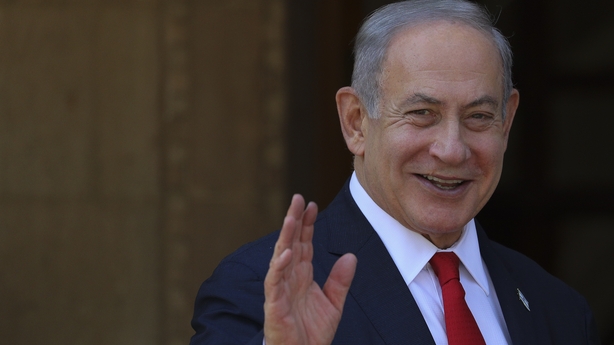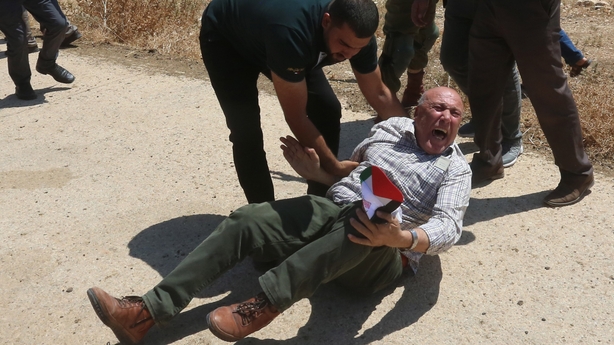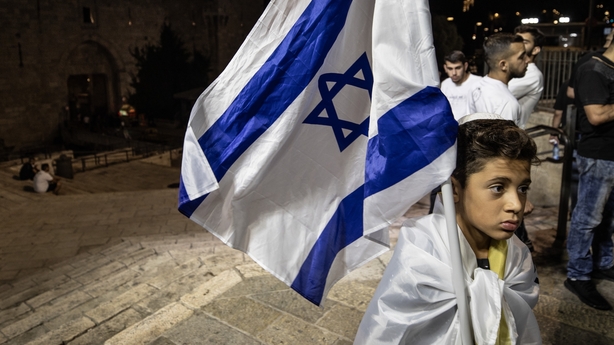Tánaiste Micheál Martin will discuss the spiralling violence in the occupied West Bank during a meeting with Israeli Prime Minister Benjamin Netanyahu in Jerusalem today.
Mr Martin is expected to underscore the need for a peace deal that would establish a Palestinian state alongside Israel, known as the two-state solution.
But it would come just weeks after Mr Martin said he was concerned that such a solution was "increasingly unviable" in the face of escalation by the Israeli government and settler violence in the West Bank.
Speaking in the Dáil in July, the Tánaiste was reflecting broadly held despair about the state of the Israel-Palestine peace process.
"There's no evidence to suggest that things are advancing, that there's even a peace process," Donnacha Ó Beacháin, Professor of Politics at DCU, said.

Since Mr Netanyahu returned last December as prime minister at the helm of the most far-right government in Israeli history, the region has experienced its bloodiest period since 2005, when Palestinians launched a major uprising known as the Second Intifada.
The United Nations estimates that 200 Palestinians and around 30 Israelis have been killed in the West Bank and Israel so far this year.
Mr Netanyahu's government is a coalition of hardline nationalists, staunch conservatives and activists who believe that Jewish settlements in the occupied West Bank, which Israeli forces captured in 1967, should be expanded.
They refer to it by its biblical names, Judea and Samaria, and believe it to be the birthright of the Jewish people.
The number of settlements in Palestinian territory has grown rapidly this year, and the Israeli government has approved plans for thousands more housing units in the West Bank.

Ahead of his meeting with Mr Netanyahu, the Tánaiste is due to visit the World Holocaust Remembrance Centre, known as Yad Vashem. There, he will rekindle the eternal flame in the Hall of Remembrance.
After a visit to Lod, a mixed Jewish-Arab city, and the National Library of Israel, he will meet Foreign Minister Eli Cohen and Minister for Strategic Affairs Ron Dermer.
At his meeting with Mr Netanyahu, and in a speech this evening at the Israeli Council on Foreign Relations, Mr Martin is likely to emphasise that the settlements represent a breach of international law and undermine any prospect of a peace deal.
In doing so, he would be reiterating a long-standing Irish Government position, and one that is shared by most countries.
In a statement, the Tánaiste said he anticipated a "wide-ranging, open exchange of views" with Mr Netanyahu and his ministerial colleagues.
"Our discussions will cover a broad range of issues including underlining Ireland's strong commitment to combating anti-Semitism and I look forward to updating on our domestic and international engagement on this issue," he said.
"I will also raise my deep concern at recent developments in the occupied Palestinian territory and the negative trajectory we are witnessing."

For many pro-Palestine activists, it is not enough, however.
"They're going to pedal the same lines. They're going to talk about the same old things," Brendan Browne, an assistant professor in conflict resolution at TCD, said.
Instead, he called on the Government to take "genuine steps" to hold Israel to account for its actions in recent years.
Such steps are unlikely on this visit – not least because of how Ireland is viewed in Israel.
"The perception in Israel is that Ireland is not only one of the most - but the most - hostile states as regards to its relations with Israel," said Prof Ó Beacháin.
There are several factors at play. In part, it is because of Ireland's strong pro-Palestine activist movement, and because Israel does not draw a distinction between the Irish government's position and the views expressed by civil society groups and in the media.
But there is also cross-party consensus in Ireland on the fundamental facets of the conflict, Prof Ó Beacháin said.
As such, Ireland is one of the more vocal member states about the issue at an EU level.
The conflict had largely fallen off the EU agenda even before the war in Ukraine.
"Countries like Ireland, Luxembourg and Belgium have been the only ones really active on the Israel-Palestine conflict," Martin Konečný, the director of the European Middle East Project, said.
Mr Konečný said that, while countries like France and Germany sometimes play a role, Ireland has been particularly consistent at each level of the EU decision-making process.
But, even then, it is not the case that Ireland has a different position to the majority of member states. Rather, Ireland simply points to existing common EU positions, he said.
Mr Konečný said that there was therefore "nothing" in the Irish Government approach that could be reasonably described as anti-Israel.
"It's very basic things like support for a two-state solution, respect for international law, and opposition to settlements," he said.
"And they are just taking it more seriously. They are committed to these positions."






